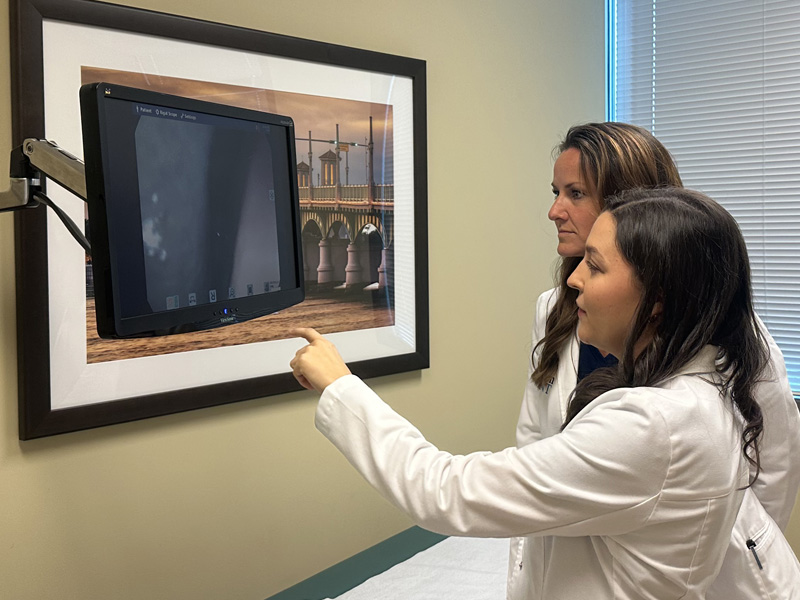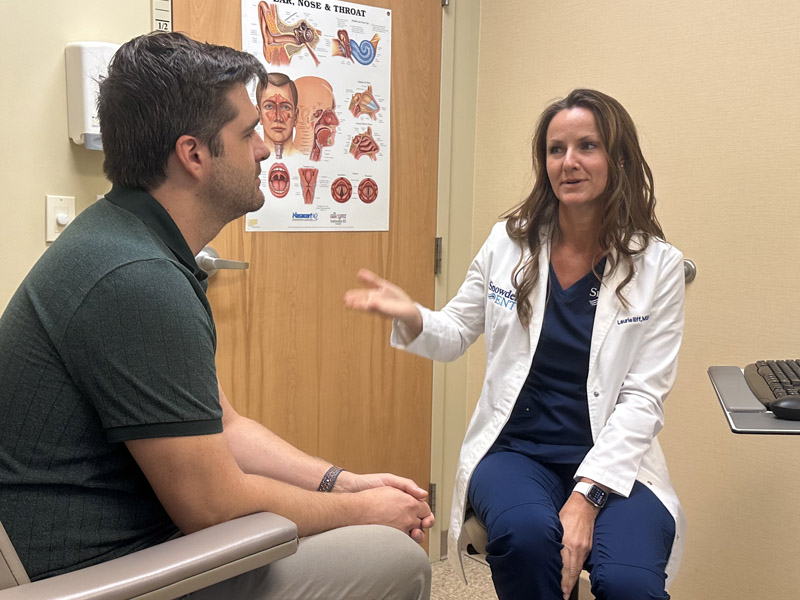
Throat and Voice Specialist in Jacksonville
Advanced Treatments and Procedures for A Variety of Throat and Voice Conditions
Your voice is one of your most powerful tools for communication, expression, and connection. When voice or throat problems arise, they can significantly affect your personal, professional, and emotional well-being. At Snowden ENT, our board-certified throat and voice specialist in Jacksonville, Dr. Robert Todd Snowden offers expert evaluation and treatment for a wide range of throat and vocal cord conditions, helping patients restore healthy voice function and regain vocal confidence.
We understand the unique demands placed on the voice. Whether you’re a teacher, singer, public speaker, or simply want to speak without strain or discomfort. Our approach combines advanced diagnostic technology with personalized treatment plans to effectively address both common and complex throat and voice disorders such as the more common conditions listed below.
If you’re experiencing throat discomfort, hoarseness, vocal fatigue, pitch changes, difficulty projecting your voice, or discomfort that lasts longer than two weeks, we encourage you to schedule an appointment by calling (904) 268-6366 or by using the form below.
- Throat and Voice Conditions, Treatments and Procedures
- Silent Throat Reflux (Laryngopharyngeal Reflux – LPR)
- Swallowing Difficulties (Dysphagia)
- Chronic Cough
- Frequent Throat Clearing
- Laryngitis
- Vocal Cord Paralysis
- Vocal Cord Nodules and Polyps
- Spasmodic Dysphonia (Involuntary spasms of the vocal cords)
- Red Flag Symptoms in the Throat
- Expert Diagnosis and Treatment
- What Our Patients Are Saying
- Contact Us!

Throat and Voice Specialist in Jacksonville
Advanced Treatments and Procedures for A Variety of Throat and Voice Conditions
Your voice is one of your most powerful tools for communication, expression, and connection. When voice or throat problems arise, they can significantly affect your personal, professional, and emotional well-being. At Snowden ENT, our board-certified throat and voice specialist in Jacksonville, Dr. Robert Todd Snowden offers expert evaluation and treatment for a wide range of throat and vocal cord conditions, helping patients restore healthy voice function and regain vocal confidence.
We understand the unique demands placed on the voice. Whether you’re a teacher, singer, public speaker, or simply want to speak without strain or discomfort. Our approach combines advanced diagnostic technology with personalized treatment plans to effectively address both common and complex throat and voice disorders such as the more common conditions listed below.
If you’re experiencing throat discomfort, hoarseness, vocal fatigue, pitch changes, difficulty projecting your voice, or discomfort that lasts longer than two weeks, we encourage you to schedule an appointment by calling (904) 268-6366 or by using the form below.

- Throat and Voice Conditions, Treatments and Procedures
- Silent Throat Reflux (Laryngopharyngeal Reflux – LPR)
- Swallowing Difficulties (Dysphagia)
- Chronic Cough
- Frequent Throat Clearing
- Laryngitis
- Vocal Cord Paralysis
- Vocal Cord Nodules and Polyps
- Spasmodic Dysphonia (Involuntary spasms of the vocal cords)
- Red Flag Symptoms in the Throat
- Expert Diagnosis and Treatment
- What Our Patients Are Saying
- Contact Us!
Throat and Voice Conditions, Treatments and Procedures
Dr. Robert Todd Snowden is a respected throat and voice specialist in Jacksonville who offers comprehensive evaluation and treatment for a wide range of voice and throat disorders. Whether you’re experiencing chronic hoarseness, difficulty swallowing, frequent throat clearing, or unexplained voice changes, understanding the root cause is the first step toward relief. Below, you’ll find in-depth information on some of the most common conditions we diagnose and treat at Snowden ENT. Each section provides a clear overview of the condition, its symptoms, and the treatment options available to help restore your comfort and quality of life.
Throat and Voice Conditions, Treatments and Procedures
Dr. Robert Todd Snowden is a respected throat and voice specialist in Jacksonville who offers comprehensive evaluation and treatment for a wide range of voice and throat disorders. Whether you’re experiencing chronic hoarseness, difficulty swallowing, frequent throat clearing, or unexplained voice changes, understanding the root cause is the first step toward relief. Below, you’ll find in-depth information on some of the most common conditions we diagnose and treat at Snowden ENT. Each section provides a clear overview of the condition, its symptoms, and the treatment options available to help restore your comfort and quality of life.
Silent Throat Reflux (Laryngopharyngeal Reflux – LPR)
Silent Throat Reflux (Laryngopharyngeal Reflux – LPR)
LPR, or “silent reflux,” is one of the most common causes of throat symptoms. Unlike typical acid reflux, it doesn’t always cause heartburn. Instead, it often shows up as hoarseness, chronic throat clearing, cough, or a lump-in-the-throat sensation.
Because it’s so common and often overlooked, we’ve created a dedicated page with details on symptoms, diagnosis, and treatment options.
Silent Throat Reflux (Laryngopharyngeal Reflux – LPR)
Silent Throat Reflux (Laryngopharyngeal Reflux – LPR)
LPR, or “silent reflux,” is one of the most common causes of throat symptoms. Unlike typical acid reflux, it doesn’t always cause heartburn. Instead, it often shows up as hoarseness, chronic throat clearing, cough, or a lump-in-the-throat sensation.
Because it’s so common and often overlooked, we’ve created a dedicated page with details on symptoms, diagnosis, and treatment options.
Swallowing Difficulties (Dysphagia)
Swallowing is something most people do thousands of times a day without thinking. For individuals with dysphagia, however, it can become painful, difficult, or even dangerous. Dysphagia can occur at any age but is more common in older adults or those with neurological or structural conditions. If you or a loved one is struggling to eat, drink, or swallow pills, it is important to seek care from a qualified voice specialist such as Dr. Robert Todd Snowden at Snowden ENT.
Dr. Snowden and his team provide expert evaluation and personalized treatment using the latest diagnostic and therapeutic techniques to restore safe and effective swallowing.
Symptoms may include:
- Sensation of food sticking in the throat or chest
- Coughing or choking while eating or drinking
- Painful swallowing
- Hoarseness after swallowing
- Recurrent pneumonia
Treatment Options:
Evaluation may include flexible laryngoscopy or imaging tests such as a videofluoroscopic swallow study (modified barium swallow) or esophagram. Treatment may also involve consultation with speech-language pathology or gastroenterology. Once the cause is identified, therapy is tailored to each patient’s specific needs.
Medications
If inflammation or reflux is suspected, medications such as proton pump inhibitors (PPIs) or H2 blockers may be prescribed.
Surgical Options
If dysphagia is caused by an obstruction or structural defect, Dr. Snowden may recommend:
- Dilation procedures to widen a narrowed esophagus
- Removal of diverticula or obstructive growths
- Botox injections into overactive muscles (e.g., in achalasia)
- In some cases, a bariatric surgeon or gastroenterologist may be consulted as part of your treatment team.
Swallowing Difficulties (Dysphagia)
Swallowing is something most people do thousands of times a day without thinking. For individuals with dysphagia, however, it can become painful, difficult, or even dangerous. Dysphagia can occur at any age but is more common in older adults or those with neurological or structural conditions. If you or a loved one is struggling to eat, drink, or swallow pills, it is important to seek care from a qualified voice specialist such as Dr. Robert Todd Snowden at Snowden ENT.
Dr. Snowden and his team provide expert evaluation and personalized treatment using the latest diagnostic and therapeutic techniques to restore safe and effective swallowing.
Symptoms may include:
- Sensation of food sticking in the throat or chest
- Coughing or choking while eating or drinking
- Painful swallowing
- Hoarseness after swallowing
- Recurrent pneumonia
Treatment Options:
Evaluation may include flexible laryngoscopy or imaging tests such as a videofluoroscopic swallow study (modified barium swallow) or esophagram. Treatment may also involve consultation with speech-language pathology or gastroenterology. Once the cause is identified, therapy is tailored to each patient’s specific needs.
Medications
If inflammation or reflux is suspected, medications such as proton pump inhibitors (PPIs) or H2 blockers may be prescribed.
Surgical Options
If dysphagia is caused by an obstruction or structural defect, Dr. Snowden may recommend:
- Dilation procedures to widen a narrowed esophagus
- Removal of diverticula or obstructive growths
- Botox injections into overactive muscles (e.g., in achalasia)
- In some cases, a bariatric surgeon or gastroenterologist may be consulted as part of your treatment team.

Chronic Cough
Chronic cough can affect as many as 1 in 10 adults, but it can affect a major impact on sleep, work, and quality of life.
Symptoms May Also Include:
- Throat irritation or frequent throat clearing
- Hoarseness or voice changes
- Sensation of postnasal drip
- Swallowing changes
Common causes:
Most chronic cough is caused by one (or more) treatable conditions:
- Postnasal drip (upper airway cough syndrome): Drainage from the nose or sinuses dripping into the throat.
- Asthma: Often worse at night or with exercise.
- Reflux (GERD or LPR): Acid flowing back into the throat.
- Medication side effects: Certain blood pressure medicines (ACE inhibitors).
- Smoking or irritants: Tobacco smoke, dust, or chemicals.
Less commonly, a chronic cough may be due to long-term lung conditions such as COPD, scarring or widening of the airways (called bronchiectasis), ongoing infections, or, rarely, more serious problems like lung cancer.
Treatment Options:
Treatment depends on the cause and may include:
- Nasal sprays, antihistamines, or decongestants for postnasal drip
- Inhalers or asthma medicines for asthma
- Lifestyle changes and acid-reducing medicine for reflux (GERD or LPR)
- Stopping or changing medicines if cough is drug-related
- Quitting smoking and avoiding irritants when exposures are the trigger
If standard treatments don’t help, additional options may include:
- Speech therapy to retrain the cough reflex
- Special medications (such as gabapentin) for severe, nerve-related coughs
Chronic cough is common and usually treatable. Most cases improve once the underlying cause is identified. If your cough isn’t going away—or if you have red-flag symptoms—it’s important to be evaluated by a specialist. At Snowden ENT, our team can help uncover the cause and create a personalized treatment plan.
Chronic Cough
Chronic cough can affect as many as 1 in 10 adults, but it can affect a major impact on sleep, work, and quality of life.
Symptoms May Also Include:
- Throat irritation or frequent throat clearing
- Hoarseness or voice changes
- Sensation of postnasal drip
- Swallowing changes
Common causes:
Most chronic cough is caused by one (or more) treatable conditions:
- Postnasal drip (upper airway cough syndrome): Drainage from the nose or sinuses dripping into the throat.
- Asthma: Often worse at night or with exercise.
- Reflux (GERD or LPR): Acid flowing back into the throat.
- Medication side effects: Certain blood pressure medicines (ACE inhibitors).
- Smoking or irritants: Tobacco smoke, dust, or chemicals.
Less commonly, a chronic cough may be due to long-term lung conditions such as COPD, scarring or widening of the airways (called bronchiectasis), ongoing infections, or, rarely, more serious problems like lung cancer.
Treatment Options:
Treatment depends on the cause and may include:
- Nasal sprays, antihistamines, or decongestants for postnasal drip
- Inhalers or asthma medicines for asthma
- Lifestyle changes and acid-reducing medicine for reflux (GERD or LPR)
- Stopping or changing medicines if cough is drug-related
- Quitting smoking and avoiding irritants when exposures are the trigger
If standard treatments don’t help, additional options may include:
- Speech therapy to retrain the cough reflex
- Special medications (such as gabapentin) for severe, nerve-related coughs
Chronic cough is common and usually treatable. Most cases improve once the underlying cause is identified. If your cough isn’t going away—or if you have red-flag symptoms—it’s important to be evaluated by a specialist. At Snowden ENT, our team can help uncover the cause and create a personalized treatment plan.
Frequent Throat Clearing
The urge to clear your throat is different from coughing. It usually feels like irritation, tickling, or the sensation of something stuck in the throat (“globus”). Many people clear their throat without even realizing it, and the habit can become persistent.
Common Causes:
- Excess mucus or drainage: Conditions like allergies, sinus problems, or postnasal drip can cause mucus to collect in the throat and trigger the urge to clear it.
- Reflux (GERD or LPR): Stomach acid that reaches the throat can cause irritation, hoarseness, and a lump-in-the-throat feeling, even without heartburn.
- Habit: Sometimes throat clearing starts with an initial trigger but then becomes a learned behavior, continuing even after the original problem is gone.
- Globus sensation: The feeling of something stuck in the throat may come from inflammation, mucus, or irritation of the throat muscles and nerves.
Chronic throat clearing is often caused by more than one factor, making the problem harder to break.
Treatment Options:
- Allergy and sinus treatment such as nasal sprays or antihistamines
- Reflux management through diet, lifestyle changes, and medication
- Voice therapy or speech therapy to help break the cycle of habitual throat clearing
- Specialized medicines (in select cases) to reduce nerve sensitivity in the throat
Frequent Throat Clearing
The urge to clear your throat is different from coughing. It usually feels like irritation, tickling, or the sensation of something stuck in the throat (“globus”). Many people clear their throat without even realizing it, and the habit can become persistent.
Common Causes:
- Excess mucus or drainage: Conditions like allergies, sinus problems, or postnasal drip can cause mucus to collect in the throat and trigger the urge to clear it.
- Reflux (GERD or LPR): Stomach acid that reaches the throat can cause irritation, hoarseness, and a lump-in-the-throat feeling, even without heartburn.
- Habit: Sometimes throat clearing starts with an initial trigger but then becomes a learned behavior, continuing even after the original problem is gone.
- Globus sensation: The feeling of something stuck in the throat may come from inflammation, mucus, or irritation of the throat muscles and nerves.
Chronic throat clearing is often caused by more than one factor, making the problem harder to break.
Treatment Options:
- Allergy and sinus treatment such as nasal sprays or antihistamines
- Reflux management through diet, lifestyle changes, and medication
- Voice therapy or speech therapy to help break the cycle of habitual throat clearing
- Specialized medicines (in select cases) to reduce nerve sensitivity in the throat
Laryngitis
Laryngitis is inflammation of the larynx (voice box). It usually affects the vocal cords, causing them to swell and disrupt normal vibration. The result is a voice that may sound hoarse, weak, raspy, or be temporarily lost. Laryngitis may be acute and short-lived or chronic, lasting weeks or longer.
Whether symptoms come on suddenly or persist over time, evaluation by an experienced voice specialist in Jacksonville is important to identify the cause, guide treatment, and protect long-term vocal health.
Symptoms may include:
- Hoarse, raspy, or weak voice
- Sudden or temporary loss of voice
- Unusual changes in pitch or difficulty controlling pitch
- Vocal fatigue (voice tires easily)
- Throat dryness or discomfort when speaking
Treatment Options:
The treatment for laryngitis varies depending on whether the condition is acute or chronic, and what is causing the vocal cord inflammation.
Voice Rest and Supportive Care for Acute Laryngitis
Most acute cases—often from viral infections or vocal strain—improve with conservative care:
- Voice rest – avoid speaking, whispering, or singing until the inflammation subsides
- Hydration – drinking plenty of water to keep the vocal cords moist
- Humidifiers or steam inhalation to soothe the larynx
- Avoiding irritants such as smoke, alcohol, and caffeine
- Pain relievers or throat lozenges for discomfort
- Antibiotics are not usually helpful unless a bacterial infection is confirmed.
Medical Management for Chronic Laryngitis
Chronic cases often result from ongoing irritation. Treatment may include:
- Acid reflux management (medication and diet changes)
- Allergy medications or nasal sprays to reduce postnasal drip
- Stop smoking (tobacco and marijuana)
- Treatment for sinus infections or chronic rhinitis
Voice Therapy
In cases related to vocal misuse, overuse, or functional voice disorders, voice therapy with a trained speech-language pathologist is essential. Therapy can help you:
- Learn proper vocal technique
- Improve breath support
- Eliminate harmful vocal habits
- Build vocal stamina and flexibility
Voice therapy is often combined with medical or surgical treatment to prevent recurrence.
Surgical Intervention
If laryngitis has resulted in benign lesions (such as polyps or granulomas) or if conservative therapy fails, surgery may be indicated. Using minimally invasive micro-laryngoscopic techniques, Dr. Snowden can:
- Remove lesions on the vocal cords
- Biopsy suspicious growths
- Reconstruct or realign affected tissues
All surgical approaches are designed to preserve your natural voice and protect long-term vocal health.
Laryngitis
Laryngitis is inflammation of the larynx (voice box). It usually affects the vocal cords, causing them to swell and disrupt normal vibration. The result is a voice that may sound hoarse, weak, raspy, or be temporarily lost. Laryngitis may be acute and short-lived or chronic, lasting weeks or longer.
Whether symptoms come on suddenly or persist over time, evaluation by an experienced voice specialist in Jacksonville is important to identify the cause, guide treatment, and protect long-term vocal health.
Symptoms may include:
- Hoarse, raspy, or weak voice
- Sudden or temporary loss of voice
- Unusual changes in pitch or difficulty controlling pitch
- Vocal fatigue (voice tires easily)
- Throat dryness or discomfort when speaking
Treatment Options:
The treatment for laryngitis varies depending on whether the condition is acute or chronic, and what is causing the vocal cord inflammation.
Voice Rest and Supportive Care for Acute Laryngitis
Most acute cases—often from viral infections or vocal strain—improve with conservative care:
- Voice rest – avoid speaking, whispering, or singing until the inflammation subsides
- Hydration – drinking plenty of water to keep the vocal cords moist
- Humidifiers or steam inhalation to soothe the larynx
- Avoiding irritants such as smoke, alcohol, and caffeine
- Pain relievers or throat lozenges for discomfort
- Antibiotics are not usually helpful unless a bacterial infection is confirmed.
Medical Management for Chronic Laryngitis
Chronic cases often result from ongoing irritation. Treatment may include:
- Acid reflux management (medication and diet changes)
- Allergy medications or nasal sprays to reduce postnasal drip
- Stop smoking (tobacco and marijuana)
- Treatment for sinus infections or chronic rhinitis
Voice Therapy
In cases related to vocal misuse, overuse, or functional voice disorders, voice therapy with a trained speech-language pathologist is essential. Therapy can help you:
- Learn proper vocal technique
- Improve breath support
- Eliminate harmful vocal habits
- Build vocal stamina and flexibility
Voice therapy is often combined with medical or surgical treatment to prevent recurrence.
Surgical Intervention
If laryngitis has resulted in benign lesions (such as polyps or granulomas) or if conservative therapy fails, surgery may be indicated. Using minimally invasive micro-laryngoscopic techniques, Dr. Snowden can:
- Remove lesions on the vocal cords
- Biopsy suspicious growths
- Reconstruct or realign affected tissues
All surgical approaches are designed to preserve your natural voice and protect long-term vocal health.

Vocal Cord Paralysis
Vocal cord paralysis occurs when one or both vocal cords (vocal folds) don’t move properly. Because the cords are essential for voice, swallowing, and breathing, paralysis can cause a weak or breathy voice, swallowing difficulties, or breathing problems. Dr. Robert Todd Snowden, a voice specialist in Jacksonville, offers advanced diagnosis and individualized treatment.
Symptoms may include:
- Weak or breathy voice
- Difficulty projecting the voice
- Shortness of breath while speaking
- Coughing or choking while eating or drinking
Treatment Options:
Treatment is individualized and depends on the severity of symptoms, the cause of the paralysis, and how long the voice has been affected. At our clinic, Dr. Snowden offers both nonsurgical and surgical treatment options, with referral to other specialists if needed.
- Voice Therapy – Often the first step in mild or temporary cases, helping strengthen the functioning cord, improve breath support, and teach compensation techniques.
- Injection Laryngoplasty – A minimally invasive procedure, usually temporary, where a filler is injected into the paralyzed cord to improve closure and reduce aspiration; useful for temporary paralysis when recovery is expected.
- Medialization Thyroplasty (Type I) – Surgical implant to reposition the paralyzed cord closer to the midline, improving voice and swallowing.
- Arytenoid Adduction or Reinnervation – Advanced options to adjust cartilage position or reconnect nerves in selected cases.
- Tracheostomy (for Bilateral Paralysis) – In rare cases when both cords are paralyzed and the airway is compromised, a surgical airway may be required, with later procedures to optimize voice.
Vocal Cord Paralysis
Vocal cord paralysis occurs when one or both vocal cords (vocal folds) don’t move properly. Because the cords are essential for voice, swallowing, and breathing, paralysis can cause a weak or breathy voice, swallowing difficulties, or breathing problems. Dr. Robert Todd Snowden, a voice specialist in Jacksonville, offers advanced diagnosis and individualized treatment.
Symptoms may include:
- Weak or breathy voice
- Difficulty projecting the voice
- Shortness of breath while speaking
- Coughing or choking while eating or drinking
Treatment Options:
Treatment is individualized and depends on the severity of symptoms, the cause of the paralysis, and how long the voice has been affected. At our clinic, Dr. Snowden offers both nonsurgical and surgical treatment options, with referral to other specialists if needed.
- Voice Therapy – Often the first step in mild or temporary cases, helping strengthen the functioning cord, improve breath support, and teach compensation techniques.
- Injection Laryngoplasty – A minimally invasive procedure, usually temporary, where a filler is injected into the paralyzed cord to improve closure and reduce aspiration; useful for temporary paralysis when recovery is expected.
- Medialization Thyroplasty (Type I) – Surgical implant to reposition the paralyzed cord closer to the midline, improving voice and swallowing.
- Arytenoid Adduction or Reinnervation – Advanced options to adjust cartilage position or reconnect nerves in selected cases.
- Tracheostomy (for Bilateral Paralysis) – In rare cases when both cords are paralyzed and the airway is compromised, a surgical airway may be required, with later procedures to optimize voice.
Vocal Cord Nodules and Polyps
Vocal cord nodules and polyps are two of the most common benign (non-cancerous) growths on the vocal cords. They often develop in people who use their voice heavily—singers, teachers, coaches, or anyone who speaks forcefully or frequently. Although they share some symptoms, nodules and polyps are distinct in their appearance and cause. Both can lead to persistent hoarseness, vocal fatigue, and reduced performance. Early evaluation by a voice specialist in Jacksonville is key for accurate diagnosis and treatment.
What Are Vocal Cord Nodules?
- Often called “singer’s nodules” or “calluses of the vocal cords”
- Small, firm, symmetrical growths that usually appear on both cords at the point of maximum contact
- Develop gradually from chronic misuse or overuse (repeated collision of the cords causes swelling that hardens into callus-like nodules)
What Are Vocal Cord Polyps?
- Softer, swollen, blister-like growths, usually on one cord
- May form after a single episode of vocal trauma (e.g., severe coughing, yelling at a concert or game)
- Can vary in size and shape
Symptoms may include:
- Hoarseness
- Rough or raspy voice
- Vocal fatigue
- Decreased pitch or vocal range
Treatment:
For Vocal Cord Nodules:
- Voice therapy is the first-line treatment. A speech-language pathologist helps improve technique, reduce strain, and retrain vocal function. Therapy may include breathing exercises, posture correction, and vocal hygiene education. With consistent therapy and vocal rest, nodules often shrink or resolve completely.
For Vocal Cord Polyps:
- Small polyps may improve with voice therapy or with steroid injection (under anesthesia).
- Larger or persistent polyps often require microsurgical removal, performed by Dr. Snowden using specialized instruments under a surgical microscope. This minimally invasive approach preserves healthy tissue.
- Post-operative voice therapy is essential to restore function and prevent recurrence.
Vocal Cord Nodules and Polyps
Vocal cord nodules and polyps are two of the most common benign (non-cancerous) growths on the vocal cords. They often develop in people who use their voice heavily—singers, teachers, coaches, or anyone who speaks forcefully or frequently. Although they share some symptoms, nodules and polyps are distinct in their appearance and cause. Both can lead to persistent hoarseness, vocal fatigue, and reduced performance. Early evaluation by a voice specialist in Jacksonville is key for accurate diagnosis and treatment.
What Are Vocal Cord Nodules?
- Often called “singer’s nodules” or “calluses of the vocal cords”
- Small, firm, symmetrical growths that usually appear on both cords at the point of maximum contact
- Develop gradually from chronic misuse or overuse (repeated collision of the cords causes swelling that hardens into callus-like nodules)
What Are Vocal Cord Polyps?
- Softer, swollen, blister-like growths, usually on one cord
- May form after a single episode of vocal trauma (e.g., severe coughing, yelling at a concert or game)
- Can vary in size and shape
Symptoms may include:
- Hoarseness
- Rough or raspy voice
- Vocal fatigue
- Decreased pitch or vocal range
Treatment:
For Vocal Cord Nodules:
- Voice therapy is the first-line treatment. A speech-language pathologist helps improve technique, reduce strain, and retrain vocal function. Therapy may include breathing exercises, posture correction, and vocal hygiene education. With consistent therapy and vocal rest, nodules often shrink or resolve completely.
For Vocal Cord Polyps:
- Small polyps may improve with voice therapy or with steroid injection (under anesthesia).
- Larger or persistent polyps often require microsurgical removal, performed by Dr. Snowden using specialized instruments under a surgical microscope. This minimally invasive approach preserves healthy tissue.
- Post-operative voice therapy is essential to restore function and prevent recurrence.
Spasmodic Dysphonia (Involuntary spasms of the vocal cords)
Spasmodic dysphonia (SD) is a rare but chronic neurological voice disorder that causes involuntary spasms of the vocal cord muscles during speech. These spasms disrupt the normal flow of the voice, resulting in a strained, tight, breathy, or interrupted vocal quality. Public figures such as Robert F. Kennedy Jr. and NPR’s Diane Rehm have openly discussed their diagnoses, providing well-known examples of this condition.
Dr. Robert Todd Snowden, our voice specialist in Jacksonville, provides expert evaluation and advanced treatment options for patients with spasmodic dysphonia and other complex voice disorders.
Symptoms may include:
- Voice breaks or interruptions during speaking
- Strangled, tight, or breathy voice
- Speech that improves when whispering, singing, or laughing
Treatment Options:
There is no known cure for spasmodic dysphonia. However, a variety of treatments can significantly improve voice quality and reduce symptoms.
Botulinum Toxin (Botox®) Injections
- The gold standard treatment since the 1980’s
- Tiny doses are injected into the affected vocal cord muscles every 3-6 months
- Weakens spasms, reduces voice breaks, and improves clarity
- Not a cure, but most patients achieve substantial and consistent improvement with each treatment
Voice Therapy
- Often used alongside Botox, especially early in treatment
- Helps patients adjust speaking techniques and optimize vocal function
- Does not stop the neurological spasms but can enhance overall results
Surgical Options (Less Common)
- Considered only when Botox is not effective or tolerated
- May include selective laryngeal denervation/reinnervation or thyroarytenoid myectomy
- Complex procedures, typically reserved for specialized centers
Spasmodic Dysphonia (Involuntary spasms of the vocal cords)
Spasmodic dysphonia (SD) is a rare but chronic neurological voice disorder that causes involuntary spasms of the vocal cord muscles during speech. These spasms disrupt the normal flow of the voice, resulting in a strained, tight, breathy, or interrupted vocal quality. Public figures such as Robert F. Kennedy Jr. and NPR’s Diane Rehm have openly discussed their diagnoses, providing well-known examples of this condition.
Dr. Robert Todd Snowden, our voice specialist in Jacksonville, provides expert evaluation and advanced treatment options for patients with spasmodic dysphonia and other complex voice disorders.
Symptoms may include:
- Voice breaks or interruptions during speaking
- Strangled, tight, or breathy voice
- Speech that improves when whispering, singing, or laughing
Treatment Options:
Treatment Options:
There is no known cure for spasmodic dysphonia. However, a variety of treatments can significantly improve voice quality and reduce symptoms.
Botulinum Toxin (Botox®) Injections
- The gold standard treatment since the 1980’s
- Tiny doses are injected into the affected vocal cord muscles every 3-6 months
- Weakens spasms, reduces voice breaks, and improves clarity
- Not a cure, but most patients achieve substantial and consistent improvement with each treatment
Voice Therapy
- Often used alongside Botox, especially early in treatment
- Helps patients adjust speaking techniques and optimize vocal function
- Does not stop the neurological spasms but can enhance overall results
Surgical Options (Less Common)
- Considered only when Botox is not effective or tolerated
- May include selective laryngeal denervation/reinnervation or thyroarytenoid myectomy
- Complex procedures, typically reserved for specialized centers
Red Flag Symptoms in the Throat
Throat cancer can develop in the mouth, tongue, tonsils, voice box (larynx), or the area behind the nose and mouth. Detecting it early is critical—treatment is far more effective when cancer is found at an early stage.
Certain symptoms are considered “red flags” because they may signal a higher risk for throat cancer and should not be ignored:
Symptoms may include:
- Lump or swelling in the neck lasting more than 2–3 weeks
- Unexplained voice change lasting longer than 2 weeks
- Persistent difficulty or pain with swallowing
- One-sided ear pain that does not go away
- Unexplained weight loss or fatigue
- Bleeding from the mouth or throat, or blood in saliva
- Mouth or throat sore/ulcer that does not heal
These symptoms don’t always mean cancer, but they should be evaluated by a healthcare professional if they persist or worsen. Risk is higher in people who smoke, drink alcohol heavily, or have a history of HPV infection. However, you do not have to be a smoker to get throat cancer. Prompt medical evaluation improves the chances of successful treatment.
Red Flag Symptoms in the Throat
Throat cancer can develop in the mouth, tongue, tonsils, voice box (larynx), or the area behind the nose and mouth. Detecting it early is critical—treatment is far more effective when cancer is found at an early stage.
Certain symptoms are considered “red flags” because they may signal a higher risk for throat cancer and should not be ignored:
Symptoms may include:
- Lump or swelling in the neck lasting more than 2–3 weeks
- Unexplained voice change lasting longer than 2 weeks
- Persistent difficulty or pain with swallowing
- One-sided ear pain that does not go away
- Unexplained weight loss or fatigue
- Bleeding from the mouth or throat, or blood in saliva
- Mouth or throat sore/ulcer that does not heal
These symptoms don’t always mean cancer, but they should be evaluated by a healthcare professional if they persist or worsen. Risk is higher in people who smoke, drink alcohol heavily, or have a history of HPV infection. However, you do not have to be a smoker to get throat cancer. Prompt medical evaluation improves the chances of successful treatment.
Expert Diagnosis and Treatment
Dr. Robert Todd Snowden is a highly respected throat and voice specialist in Jacksonville, known for his depth of expertise, patient-centered care, and use of advanced diagnostic and surgical techniques. With decades of experience treating conditions ranging from reflux and chronic hoarseness to vocal cord paralysis and spasmodic dysphonia, Dr. Snowden provides individualized solutions that prioritize both vocal performance and long-term wellness. Whether you’re a professional voice user or experiencing persistent throat symptoms, you can trust Dr. Snowden to deliver expert care tailored to your needs.
If you are experiencing a problem with your throat or voice and are concerned, schedule an appointment by calling (904) 268-5366. If it is more convenient, feel free to use our contact form below and we will get back with you as soon as possible.
Expert Diagnosis and Treatment
Dr. Robert Todd Snowden is a highly respected throat and voice specialist in Jacksonville, known for his depth of expertise, patient-centered care, and use of advanced diagnostic and surgical techniques. With decades of experience treating conditions ranging from reflux and chronic hoarseness to vocal cord paralysis and spasmodic dysphonia, Dr. Snowden provides individualized solutions that prioritize both vocal performance and long-term wellness. Whether you’re a professional voice user or experiencing persistent throat symptoms, you can trust Dr. Snowden to deliver expert care tailored to your needs.
If you are experiencing a problem with your throat or voice and are concerned, schedule an appointment by calling (904) 268-5366. If it is more convenient, feel free to use our contact form below and we will get back with you as soon as possible.
What Our Patients Are Saying
Contact Us!
(904) 268-5366
Or, if it is more convenient, use our contact form and we’ll get back to you as soon as possible.
Contact Us!
(904) 268-5366
Or, if it is more convenient, use our contact form and we’ll get back to you as soon as possible.
Snowden ENT is proud to be a select ENT Provider of the Baptist Physician Partners network. The mission of Baptist Physician Partners is to shape the future of health care in our community through an integrated partnership of providers and Baptist Health hospitals working collaboratively toward common goals for improving quality, safety, efficiency and outcomes for our patients.

12574 Flagler Center Boulevard, Suite 201
Jacksonville, FL 32258
(904) 268-5366
Monday – Thursday 8:30 AM to 4:30 PM
Friday 8:30 AM to 3:45 PM

Snowden ENT is proud to be a select ENT Provider of the Baptist Physician Partners network. The mission of Baptist Physician Partners is to shape the future of health care in our community through an integrated partnership of providers and Baptist Health hospitals working collaboratively toward common goals for improving quality, safety, efficiency and outcomes for our patients.
12574 Flagler Center Blvd.
Jacksonville, FL 32258
(904) 268-5366
Monday – Thursday 8:30 AM to 4:30 PM
Friday 8:30 AM to 3:45 PM
Copyright | Snowden ENT | All Rights Reserved | Created and Optimized by BoomClient




